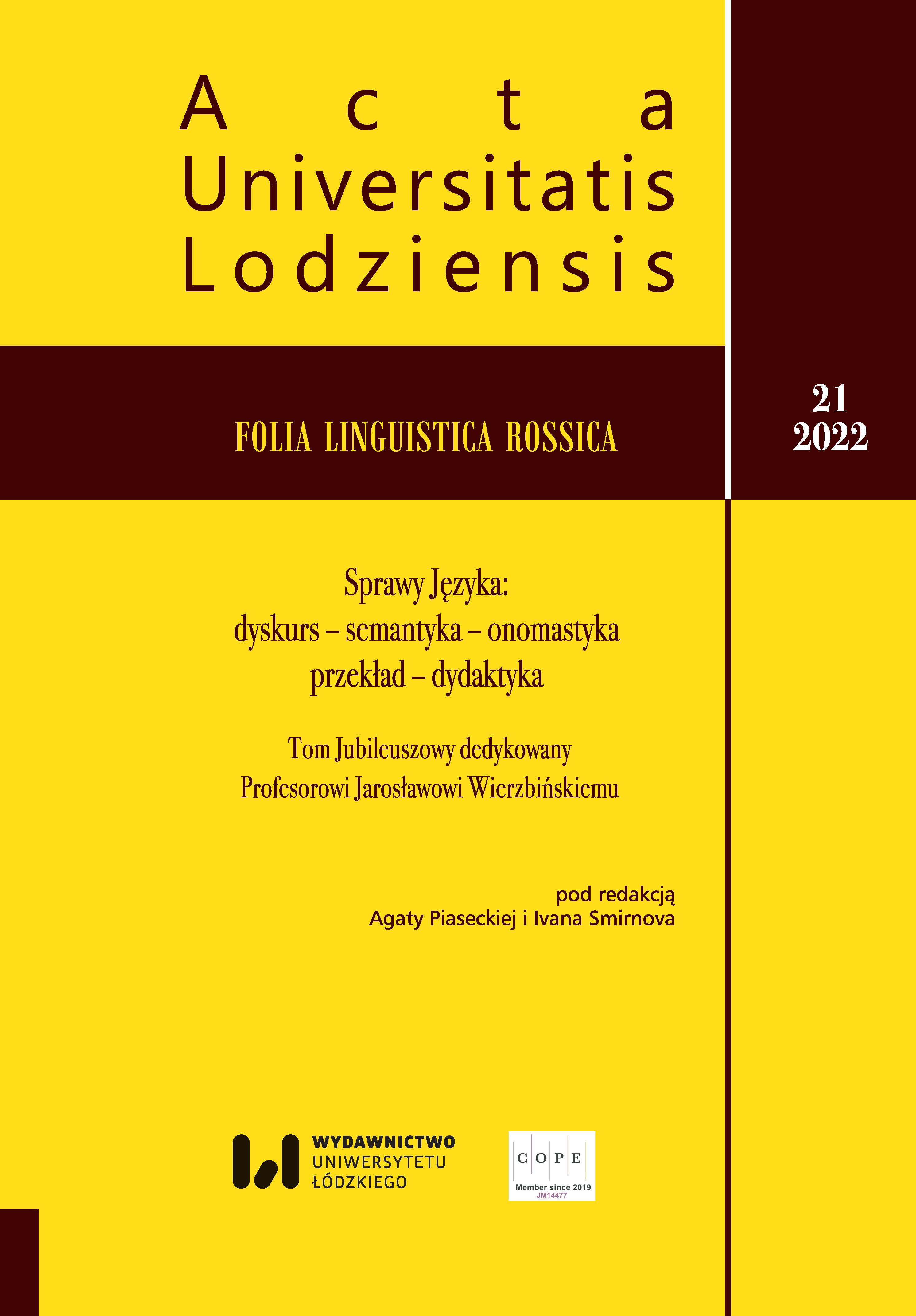Implementation of Semantic Oppositions in the Poetic Discourse of Jeŭdakija Loś
DOI:
https://doi.org/10.18778/1731-8025.21.10Keywords:
semantic opposition, parallelism, comparison, juxtaposition, lexico-grammatical representativesAbstract
The purpose of this study is to analyse the lexical and grammatical means employed in the semantic oppositions of Jeŭdakija Loś’s poetry as the basis of parallelism with relations of comparison and opposition. The article deals with the linguistic representation of the semantic oppositions life – death, light – darkness, heat – cold as basic universal categories in the discourse of the Belarusian poetess Jeŭdakija Loś. When exploring the research material, the scientific approaches of Roman Yakobson and Yuri Lotman were taken into account, who studied the role of various grammatical categories in the formation of meaning.
The relevance of the study lies in deepening the understanding of the communicative aspect of the poetic text as a dialogue between the author and the reader. The article shows the feature of decoding of meaning on the basis of not only lexical but also grammatical representatives. This makes it possible to expand the possibility of analysing poetry as an original language system in which words, interacting with each other, show combinatorial increments of meaning. As a result of this approach, the reader’s role in co-creation along with the poet becomes evident.
The functional-stylistic and structural-descriptive methods of analysis used in the study make it possible to characterize the role of linguistic means in modelling the poet’s style.
The conclusions of the article confirm the explication of the reader’s meaning through philosophical oppositions and their linguistic expression. The results of the study show the importance of further study of communicative style in creating a dialogue between the poet and the reader.
References
Альфонсов, В.Н. (2001). Поэзия Бориса Пастернака. Санкт-Петербург: САГА.
Google Scholar
Кихней, Л.Г. (1997). Поэзия Анны Ахматовой. Тайны ремесла. Москва: Диалог-МГУ.
Google Scholar
Левин, Ю.И. (1998). Избранные труды. Поэтика. Семиотика. Москва: Языки русской культуры.
Google Scholar
Макуренкова, С.А. (1994). Джон Данн: поэтика и риторика. Москва: Академия.
Google Scholar
Рашковский, Е.Б. (2016). Философия поэзии, поэзия философии. Санкт-Петербург: Алетейя.
Google Scholar
Рогоцкая, И.В. (2007). Проблемы анализа художественного и поэтического текста. Ярославль: Издательство Ярославского государственного педагогического университета.
Google Scholar
Флейшман, Л. (2006). От Пушкина к Пастернаку. Избранные работы по поэтике и истории русской литературы. Москва: Новое литературное обозрение.
Google Scholar
Фоменко, И.В. (2002). Три статьи о поэтике: Пушкин. Тютчев. Бродский. Тверь: Издательство Тверского государственного университета.
Google Scholar
Al.’fonsov, V.N. (2001). Poeziya Borisa Pasternaka. St. Petersburg: SAGA.
Google Scholar
Fleishman, L. (2006). Ot Pushkina k Pasternaku. Izbrannye raboty po poetike i istorii russkoi literatury. Moscow: Novoe literaturnoe obozrenie.
Google Scholar
Fomenko, I.V. (2002). Tri stat’i o poetike: Pushkin. Tyutchev. Brodskii. Tver: Izdatel’stvo Tverskogo gosudarstvennogo universiteta.
Google Scholar
Kikhnei, L.G. (1997). Poeziya Anny Akhmatovoi. Tainy remesla. Moscow: Dialog-MGU.
Google Scholar
Levin, Yu.I. (1998). Izbrannye trudy. Poetika. Semiotika. Moscow: Yazyki russkoi kul’tury.
Google Scholar
Makurenkova, S.A. (1994). Dzhon Dann: poetika i ritorika. Moscow: Akademiya.
Google Scholar
Rashkovskii, E.B. (2016). Filosofiya poezii, poeziya filosofii. St. Petersburg: Aleteiya.
Google Scholar
Rogotskaya, I.V. (2007). Problemy analiza khudozhestvennogo i poeticheskogo teksta. Yaroslavl: Izdatel’stvo Yaroslavskogo gosudarstvennogo pedagogicheskogo universiteta.
Google Scholar
Downloads
Published
How to Cite
Issue
Section
License

This work is licensed under a Creative Commons Attribution-NonCommercial-NoDerivatives 4.0 International License.









